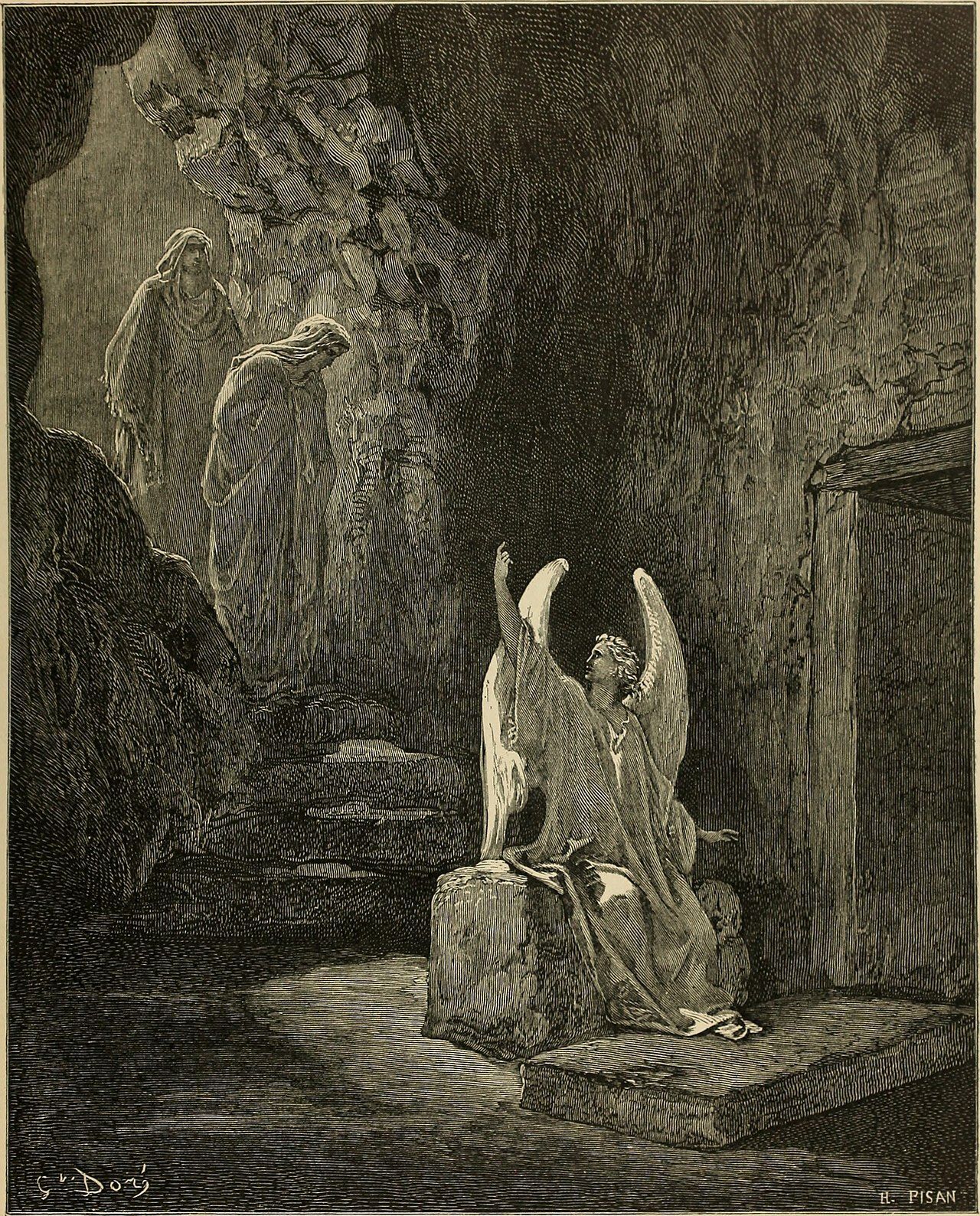
It's Saturday, April 6, 2024.
Today’s edition covers Project 18:15’s first birthday, the medieval heresy of Catharism, the resurrection of the dead, and a healthy handful of notable news.
Apologies in advance—today’s email is a little longer than usual, as I wanted to take some time for a personal word. But, I invite you to still read it to the end. I think your brain will thank you!
Project 18:15 Turns One

Photo: Polina Tankilevitch (edited)
Dear reader,
Some years ago I was struck by the superlative claim of Proverbs 3:15: “She is more precious than jewels, and nothing you desire can compare with her.”
Wow. Inspired Scripture says “she” is literally better than anything else. Who is “she”?
Wisdom.
Could you say with a straight face that most Christians seek wisdom as if nothing else is as desirable? How about wisdom’s close relative, knowledge?
That powerful pair makes a stunning appearance in Colossians 2:3, where it says that “all the treasures of wisdom and knowledge” are “hidden” in Christ. Another superlative statement! Think of the implications of that!
One implication is that Christians should be the most wise and most knowledgeable of all people. Are we?
A News Briefing, But More
In early 2023, I came across an ad for a daily news briefing—an email every morning that summarized the biggest news from the previous day.
I signed up, and I loved the format.
Then, it occurred to me: what if there were a Christian version of this? A facts-only digest of Christian news, to keep believers informed of important goings-on that don’t necessarily make mainstream news’s front page.
And, better yet, what if that digest included other knowledge Christians desperately need to know—things about the Bible and Church history that they may not learn elsewhere?
The idea for a project was born, and it soon had its name, based on the verse that says, “An intelligent heart acquires knowledge, and the ear of the wise seeks knowledge” (Proverbs 18:15).
This coming week marks one year since the launch of Project 18:15 (April 8, 2023)—your weekly briefing of news, Bible, and history from a Christian perspective, in a format that aims to be factual, faithful, and brief.
Thank you! I greatly value the time and attention you give each week to engaging with the content here as we seek knowledge together.
Truth To Be Lived
A vital piece of this knowledge-seeking endeavor is highlighted in the following quote about knowledge from biblical counselor Lou Priolo:
The concept we have of knowledge today, however, is different from the knowledge of which the Bible speaks. For to the average American, knowledge is ‘facts to be learned.’ This secular notion pursues knowledge for knowledge’s sake. The idea behind this view is to amass as much knowledge as one can in order to know more than the next person. Learning, in other words, is self-serving. . . . This self-oriented view of learning is antithetical to the biblical view. For the Christian, knowledge is not ‘facts to be learned,’ but rather ‘truth to be lived.’ Wisdom is not acquiring knowledge for the sake of knowledge, but rather for the sake of implementation.*
Project 18:15 is largely about presenting facts. But you and I are always in danger of having the facts without applying them, of being hearers but not doers (James 1:21). Let us, with God’s help, refuse this temptation—especially with God’s Word, but also with other knowledge.
While the facts shared here are presented through a Christian lens (neutrality, after all, is neither possible nor desirable), I often don’t provide analysis or reveal my own opinion. For the sake of sticking to the facts and keeping it brief, I largely leave analysis and application to you.
That doesn’t mean analysis or application shouldn’t happen—it should! Each of us followers of Christ are responsible agents capable of thinking critically and being led by the Holy Spirit to understand all things in the light of the Scriptures.
While Project 18:15’s mission is to spread knowledge—to help more Christians know more—this newsletter in itself is essentially limited to “facts to be learned.” We each need to be proactive about transforming that into “truth to be lived.”
May God grant us that, whatever we learn here together, we analyze it properly and use it well, appropriately translating it into skillful living.
Here’s to many more knowledge-seeking weekends!
Sincerely,
Anthony Langer
Founder and Editor
P.S. There are other contexts in which I do analyze and opine, such as my blog and X. And my latest article was published in Bluegrass Chronicles, another publication I help administrate (see Content Catch-Up below). Lord willing, these media are only the beginning. Stay tuned!
__________
* Lou Priolo, Pleasing People: How Not To Be An “Approval Junkie” (Phillipsburg, New Jersey: P&R Publishing, 2007), 157.
Also Noteworthy

Eleven falsely convicted pastors and ministry leaders. (Photos: ADF International and Mountain Gateway Order, Inc)
→ 11 Nicaraguan pastors and ministry leaders have been “convicted on sham charges of money laundering, sentenced to 15 years in prison and over 80 million dollars in fines per person,” according to Alliance Defending Freedom (ADF) International.
→ Ukrainian churches have seen dramatic increases in attendance since the start of the war with Russia, CBN reports. One pastor, Oleh Derkanchenk, says attendance went from 100 to as high as 700. Another pastor, Andrii Skantsev, says attendance jumped from 150 to two or three times that.
→ Former President Trump says November 5 (Election Day) will be “Christian Visibility Day,” responding to President Biden’s declaration of this past Sunday (Easter) as “Trans Visibility Day.”
→ Oklahoma Attorney General Gentner Drummond argued before the Oklahoma Supreme Court on Tuesday against the approval of a Catholic charter school, saying it violates separation of church and state. Some have criticized his position, like conservative podcaster Michael Knowles, who retorted, “With conservatives like this, who needs liberals?”
→ Over 1,200 churches left the Southern Baptist Convention in 2022, Lifeway Research reports.
→ A New Hampshire assisted suicide bill advances, despite one Catholic lawmaker’s motion to reconsider after regretting his affirmative vote. If HB 1273 passes, New Hampshire will be the eleventh state to legalize euthanasia for the terminally ill.
Content Catch-Up
Recent, notable content by Christian creators, or of Christian interest.*

The art for my article “Suspend Your Disbelief—Things Really Are This Bad: From the Baby Organ Black Market to the End of America” (Bluegrass Chronicles)
→ Suspend Your Disbelief: Suspension of disbelief used to be only for fiction, but now it’s needed for the real-life horrors around us—from the baby organ black market to the end of America. That’s the topic of my (Anthony Langer’s) latest article, published in attorney and author Jack L. Richardson IV’s publication Bluegrass Chronicles. (Article)
→ Dawkins the Cultural Christian: Famed atheist Richard Dawkins laments the demise of “cultural Christianity” in an interview posted on Monday: “Certainly, if we substituted any alternative religion, that would be truly dreadful.” (Video)
*Not necessarily an endorsement
Church History Tidbit
The Annihilation of the Cathars

Detail of “Saint Dominic presiding over an Auto-da-fe,” 1491-1499, by Pedro Berruguete. Oil on panel. (Public Domain)
Catharism (from Greek katharoí, meaning "the pure ones") was a heresy that cropped up and gained significant popularity in the Middle Ages, particularly in Italy and Southern France. The Roman Catholic Church eventually “destroyed virtually every scrap the Cathars wrote,” so we only have one side of the story about what they believed, and what we do have should be taken with that understanding.
That said, their beliefs apparently had the following notable features.
They were dualistic. They believed the universe is ruled by two uncreated, dueling gods (God and the devil); the good god created the soul and the bad god created the body. Humans are angels deceived by Satan and trapped in bodies.
They believed in reincarnation, and that a “soul would be continually reborn until it renounced the world completely and escaped incarnation.”
They exalted femininity, believing God to be both male and female. This reportedly contributed to equal treatment of the sexes in Cathar communities. Women, like men, could become the Cathar’s version of a priest, called a perfecti (the most dedicated and ascetic of the Cathars).
Related, the theme of “courtly love” and the motif of the “damsel in distress” developed in Southern France simultaneously, and was likely incorporated into the Cathars’ self-image. Marriage was discouraged, but sex was considered natural (birth control and abortion were practiced).
They were vegetarian/vegan—with the exception of fish in some cases.
They rejected most books of the Bible, and their central text was a book called The Book of Two Principles.
Perhaps obviously, they rejected the Roman Catholic Church.
The Roman Church decreed a crusade, the Albigensian Crusade (1209-1229), on Southern France’s town of Albi to wipe the Cathars out. Thousands were slaughtered—in some cases, Cathars and Catholics alike. The crusaders apparently made no distinction, as, during the massacre at Béziers, one leader is quoted as saying, “Kill them all; God will know His own.”
The heresy was not entirely stamped out by the crusade, and an Inquisition was later established to finish the job. In one case, in a rare example of a Medieval Inquisition leading to a large public execution, 200 or so Cathars were burned to death at Verona in 1278.
The Bible, Briefly
Milk: The Resurrection of the Dead

“The Resurrection,” Gustave Doré, 1891
We’re studying “milk”—the six foundational topics of Christian doctrine (Hebrews 5:12-6:2), which the Bible presents in three pairs.
The final pair of topics that the author of Hebrews lists as foundational to the Christian faith is “the resurrection of the dead, and eternal judgment” (6:2).
As discussed a few months ago, believers will be physically raised to life at the end times, and unbelievers will be physically raised to judgment. We’ll focus here on yet another aspect of resurrection: the fact that it’s essential to the Christian faith.
In 1 Corinthians 15:12-22, the apostle Paul is incredulous that some in the church of Corinth were saying “there is no resurrection of the dead” (15:12). He argues that “if there is no resurrection of the dead, then not even Christ has been raised” (15:13). He then outlines several problems that that would pose. Pastor Aaron Wojnicki of Faith Community Church (Louisville, KY) summarizes those problems like this:
If Christ hasn’t been raised, then your…
Evangelism is useless — Paul says “our preaching is in vain” (15:14), that is, it’s empty of content. We Christians preach Christ’s resurrection. If He wasn’t resurrected, we preach nothing—just nonsense.
Faith is worthless — Paul says “your faith is in vain” (15:14). If you believe in a Christ who isn’t alive, your belief does nothing for you. Faith is only as valuable as its object.
Testimony of God is false — Since Christians teach that God raised Christ from the dead, then “we are even found to be misrepresenting God” if He actually didn’t (15:15).
Sin still condemns you — If Christ isn’t alive, then He didn't beat death and sin, which means Christians are still in it: “your faith is futile and you are still in your sins” (15:17).
Dead brothers have perished — If sin still condemns us, the same is true of our Christian loved ones who have already died. They weren’t actually saved: “those also who have fallen asleep in Christ have perished” (15:18).
Life is pitiful — “If in Christ we have hope in this life only,” Paul writes, “we are of all people most to be pitied” (15:19). If your faith in Jesus somehow makes your earthly life better but doesn’t give you eternal life, then you’re living a lie and you still go to hell. It was all for nothing—pitiful.
“But in fact Christ has been raised from the dead,” Paul rejoins (15:20). How do we know? A few verses earlier (15:3-6), Wojnicki observes, Paul offered this evidence: the twelve apostles saw Jesus alive after He died, and so did hundreds of others—even 500 people at one time, most of whom were still living as Paul was writing (the implication: his original readers could go ask them about it). The fact that the twelve apostles claimed to have seen Christ resurrected is no small matter, since none of them reneged on that claim even under intense persecution and martyrdom.
Wojnicki points out that since Christ has been raised, all the six problems above are reversed. Instead, your…
Evangelism is essential
Faith is well-founded
Testimony of God is true
Sin has been forgiven
Dead brothers are in paradise
Life is envious
Isn’t that good news!
CORRECTION: Last week’s The Bible, Briefly wrongly referred to the centurion in Matthew 8 as Cornelius. Cornelius is the centurion from Acts 10, but the name of the Centurion in Matthew 8 is not mentioned. Thanks to the reader who pointed this out!
What did you think of today’s briefing?


Know someone who would enjoy this?Please SHARE this newsletter




Have some feedback for me? Reply to this email with comments or suggestions. I’d love to hear from you!
Why "18:15"? The name Project 18:15 is based on Proverbs 18:15: “An intelligent heart acquires knowledge, and the ear of the wise seeks knowledge.” The aim is for this weekly email of news, Bible, and history to help more Christians know more.
Unless otherwise indicated, all Scripture quotations are from The ESV® Bible (The Holy Bible, English Standard Version®), copyright © 2001 by Crossway, a publishing ministry of Good News Publishers. Used by permission. All rights reserved.

Copyright (C) " target="_blank">unsubscribe.
